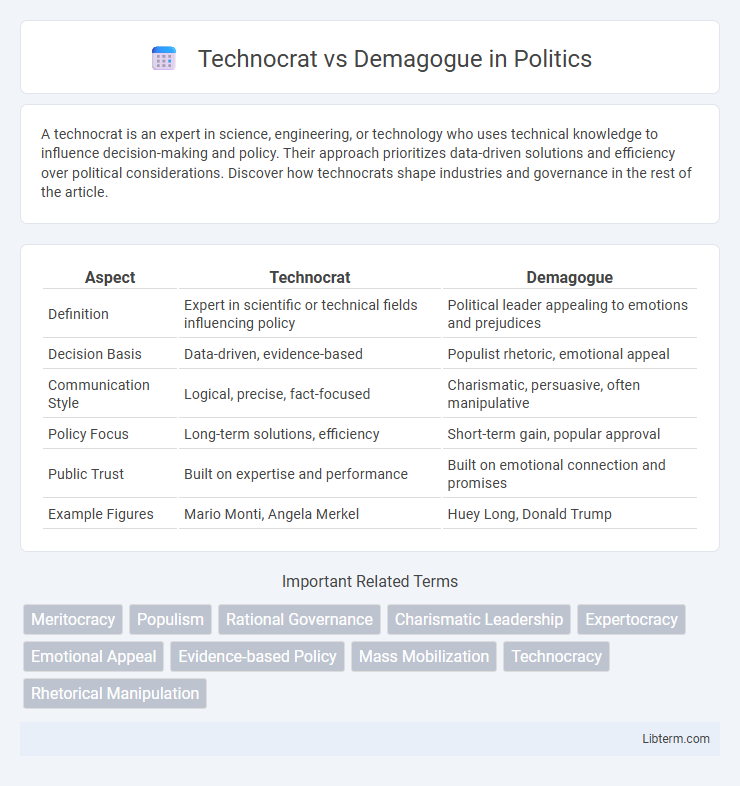A technocrat is an expert in science, engineering, or technology who uses technical knowledge to influence decision-making and policy. Their approach prioritizes data-driven solutions and efficiency over political considerations. Discover how technocrats shape industries and governance in the rest of the article.
Table of Comparison
| Aspect | Technocrat | Demagogue |
|---|---|---|
| Definition | Expert in scientific or technical fields influencing policy | Political leader appealing to emotions and prejudices |
| Decision Basis | Data-driven, evidence-based | Populist rhetoric, emotional appeal |
| Communication Style | Logical, precise, fact-focused | Charismatic, persuasive, often manipulative |
| Policy Focus | Long-term solutions, efficiency | Short-term gain, popular approval |
| Public Trust | Built on expertise and performance | Built on emotional connection and promises |
| Example Figures | Mario Monti, Angela Merkel | Huey Long, Donald Trump |
Defining the Technocrat: Expertise in Governance
Technocrats are leaders who base their governance on specialized knowledge, scientific analysis, and data-driven decision-making, emphasizing efficiency and practical solutions. Their expertise often comes from advanced education and professional experience in fields such as economics, engineering, or public administration, allowing them to implement policies grounded in facts rather than political ideology. Unlike demagogues, technocrats prioritize evidence-based approaches and institutional competence to address complex societal challenges effectively.
Understanding the Demagogue: Power Through Populism
Demagogues gain power by exploiting popular desires and fears, using emotional rhetoric to manipulate public opinion rather than relying on factual evidence or expertise. Their leadership style contrasts sharply with technocrats who govern based on specialized knowledge and rational decision-making. Understanding the demagogue involves recognizing their tactics of polarization, scapegoating, and promising simplistic solutions to complex problems.
Historical Examples of Technocrats and Demagogues
Technocrats like Jean Monnet, who played a crucial role in founding the European Coal and Steel Community, exemplify leaders who used expertise and practical knowledge to shape post-war Europe. Demagogues such as Adolf Hitler manipulated public emotions and exploited nationalist sentiments to gain power in Germany during the 1930s. Historical examples reveal distinct leadership approaches: technocrats rely on technical skills and policy expertise, while demagogues depend on rhetoric and populist appeal to influence masses.
Core Values: Rationality vs. Emotion
Technocrats prioritize rationality, evidence-based decision-making, and expertise to formulate policies that drive efficient governance and sustainable development. Demagogues appeal to emotion, using charisma and populist rhetoric to manipulate public sentiment and gain power often at the expense of factual accuracy and long-term stability. The core values of technocrats emphasize logic and data, while demagogues rely on emotional influence and mass appeal.
Leadership Styles: Data-Driven vs. Crowd-Pleasing
Technocratic leadership relies on data-driven decision-making, emphasizing expertise, analysis, and practical solutions to complex problems. Demagogic leadership prioritizes crowd-pleasing tactics, leveraging emotional appeals, popular opinions, and charismatic rhetoric to gain mass support. While technocrats focus on long-term efficacy and policy grounded in evidence, demagogues often seek immediate approval through sensationalism and simplification of issues.
Impact on Policy Making and Governance
Technocrats influence policy making through expertise-driven decisions that prioritize data, efficiency, and long-term economic growth, often resulting in technically sound but sometimes less politically popular outcomes. Demagogues impact governance by appealing to popular emotions and simplistic solutions, which can swiftly mobilize public support but risk undermining institutional stability and rational policy frameworks. The tension between technocratic precision and demagogic appeal significantly shapes legislative agendas, public trust, and the effectiveness of government institutions.
Public Perception: Trust in Experts vs. Charisma
Public perception often favors technocrats for their expertise and data-driven decision-making, fostering trust in their ability to solve complex problems efficiently. Demagogues attract followers through charismatic appeals and emotional rhetoric, creating a strong personal connection despite potential lack of substantive policy knowledge. Trust in experts typically hinges on credibility and proven competence, while charisma leverages emotional influence and populist appeal to shape public opinion.
Technocrat vs Demagogue in Crisis Management
Technocrats in crisis management rely on data-driven analysis, expert knowledge, and systematic planning to implement effective solutions, ensuring rational decision-making under pressure. Demagogues often exploit emotional appeal, polarization, and simplistic narratives to galvanize public support, potentially compromising long-term stability for immediate political gain. The contrast highlights technocrats' emphasis on evidence-based strategies versus demagogues' reliance on charisma and populist tactics during critical situations.
Strengths and Weaknesses of Each Leadership Model
Technocrats leverage expertise and data-driven decision-making to create efficient and rational policies, which enhances governance stability and long-term planning but may struggle with public engagement and emotional appeal. Demagogues excel in charismatic communication and populist rhetoric, effectively mobilizing masses and responding to immediate public sentiments, yet their leadership risks fostering division and undermining institutional checks and balances. Both models present trade-offs between analytical rigor and emotional influence, impacting policy effectiveness and social cohesion differently.
Future Implications for Politics and Society
Technocrats, emphasizing expertise and data-driven decision-making, may lead to more efficient and rational policy outcomes, fostering long-term societal stability and innovation. Demagogues, exploiting emotions and populist rhetoric, risk polarizing societies and undermining democratic institutions, potentially causing social fragmentation and governance instability. Future political landscapes could hinge on the balance between technocratic competence and demagogic appeal, influencing governance effectiveness and public trust.
Technocrat Infographic

 libterm.com
libterm.com